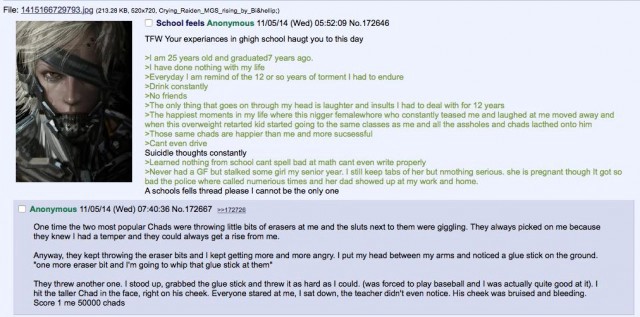Sympathy for the Nerd

If you wander for a while among certain nerd gathering-places like 4chan, or 8chan, or Wizardchan, you will see dozens of casual references to “Chad.” Chad is handsome, tall, confident and rich; he has “10/10 style” and “six pack abs” and rich parents; he is well hung, well traveled, can make interesting conversation with anyone, and is “highly skilled in the erotic arts.”
Chad, or as he became known more recently, Chad Thundercock, does not exist, but when you live in a fantasy world that doesn’t matter a bit; since first materializing sometime in 2006, Chad has become a sort of virtual water cooler, something for fellow-believers to gather around, like Ebola or ISIS or One Direction. He is an emanation, the real product of a mass hallucination — a sort of Patronus of male nerd insecurity.

The Internet’s sudden, explosive creation of concentrated wealth over the last twenty years gave rise to a thousand headlines blaring “Revenge of the Nerds” stamped over photographs of Mark Zuckerberg smirking in his infernal hoodie and Steve Jobs in a black turtleneck, aloof and superior. “Are ‘Geek’ and ‘Nerd’ Now Positive Terms?” mused the BBC; “Silicon Valley is nerd central,” the New Yorker slangily observed. In normalizing or even exalting the idea of “nerds,” the media conflated a million subcultures into one — but there hasn’t ever been just one. To be a nerd is not at all just a matter of “being into computers” and it never was: in reality, it’s about alienation.
As the Internet grew, the alienation and frustration of the nerds never really went away, but were instead all thrust into its dankest corners, where it has festered and morphed into something very ugly, and very sad. And these sad, naive nerds, in their loneliness and disaffection, have shown themselves, time and again, to be painfully vulnerable to manipulation. Senseless ragestorms and stampedes come thick and fast among them, as any cursory examination of their fora will attest. They’ve moved against game developers, against Reddit, against “social justice warriors” (this is a slur, incredibly), against Adrian Chen and Taylor Swift.
There is a real tragedy taking place in this culture, a sort of apotheosis of suffering amongst the “original” nerds — by whom I mean the ones who went mostly ignored before the Internet came along and created a mythology around them, those self-described outcasts who have had even their own tribe stolen from them, as it slowly became quite cool to identify as, or to be called, a nerd — that is to say, a nerd of a certain kind. The Jemaine Clement kind of nerd. The Rivers Cuomo kind. Not the kind who is still living at home at twenty-six and is too scared to talk to girls.

Wizardchan is an imageboard for adult male virgins, or more specifically, “a Japanese-inspired image-based forum for male virgins to share their thoughts and discuss their interests and lifestyle as a virgin. The name of our website is inspired by the wizard meme, which refers to someone who has maintained his virginity past the age of thirty. In contrast to other imageboards, Wizardchan is dedicated exclusively to people who have no sexual experience and may be NEET [Not in Education, Employment or Training] or hikkikomori.”
There is a shocking amount of pain, rage and confusion on display at Wizardchan, as there is on 8chan and 4chan, even if you’re familiar with the extremes of such things we sometimes see at Reddit. The wizards are really super especially mad at Chad.

These young men are nervous wrecks gathering to compare — or compete over — who is the most damaged, the most depressed, the most pathetic. A lot of them are suicidal, on meds. They call women (all women) “succubi” and talk to one another about how often they “masterbate” or “fap”. The main thing on their minds is sex, like most anyone in his twenties, I guess, but here it is distressed, frantic, frustrated, suffering. They live in the basement, they wish they’d been aborted, all these terrible things. They can’t look in the mirror because their own ugliness makes them cry. I mention all this not because I mean to mock them, but to point out that there are many kinds of nerds, and this kind is at the end of a certain continuum of alienation. On the very extreme end of it. These people are badly damaged; what are we doing to them?


There is this vast distance between the wizards, way over on one end of the nerd spectrum, and the media mythology praising the nerds of Silicon Valley on the other.
Marc Andreessen, the Captain Wrongway Peachfuzz of Silicon Valley, for example, fancies himself a nerd.
It is a common but incorrect myth that Silicon Valley is bro culture. Silicon Valley is nerd culture, and we are the bro’s natural enemy.
— Marc Andreessen (@pmarca) September 27, 2014
Marc Andreessen is not a nerd. I will not go so far as to say that he remotely resembles Chad Thundercock, but Andreessen is nevertheless a gregarious, wildly successful entrepreneur and investor with a net worth of hundreds of millions of dollars, and he is married to an heiress. (Maybe his old partner Eric Bina, whom Andreessen has credited with doing “the hard programming” of Mosaic on a diet of Skittles and Mountain Dew, is, or was, something of a nerd.)
It’s the glamor of men like Andreessen, the hypnotizing effect of their wealth and their influence that is at the root of the change in the public’s perception of nerd culture, and that has served to further alienate the nerds of 4chan, 8chan, Wizardchan, and communities even further flung.
There are some whose feelings of resentment and alienation make them cruel, and others in whom the same feelings result in depression, or persecution mania, or snaky Machiavellian deceit, and still others who are somehow able to transcend such feelings. Such as Arthur Chu, who recently wrote very movingly about meeting Felicia Day — a woman gamer recently targeted by Gamergate activists, and one who had once helped Chu emerge from the solipsism and misanthropy of his youth. Chu’s successful integration into mainstream society has made him a polarizing figure among the nerds, unsurprisingly, complete with a ragestorm of his own.
Almost everyone, even the most beautiful and accomplished among us, grows up thinking of himself as fragile, vulnerable, insecure, hanging by a thread a lot of the time. So because hearing about fear and insecurity is familiar to everyone, it is very easy to forget the breadth of the nerd spectrum, or the wider spectrum of human alienation. There are so many people in the world who are truly alone, who never were invited to a single party or made one single friend, who’ve never been kissed, who literally do live with their parents and never, ever speak to anyone; if we learn anything from the increasingly volatile lashing out of certain nerd communities, perhaps it should be that pain is pain, and that it is real and it all ought to be taken seriously and treated with compassion, instead of going, “Ew.”
Maria Bustillos is a writer and critic in Los Angeles.
Photo by Ronald Heft
